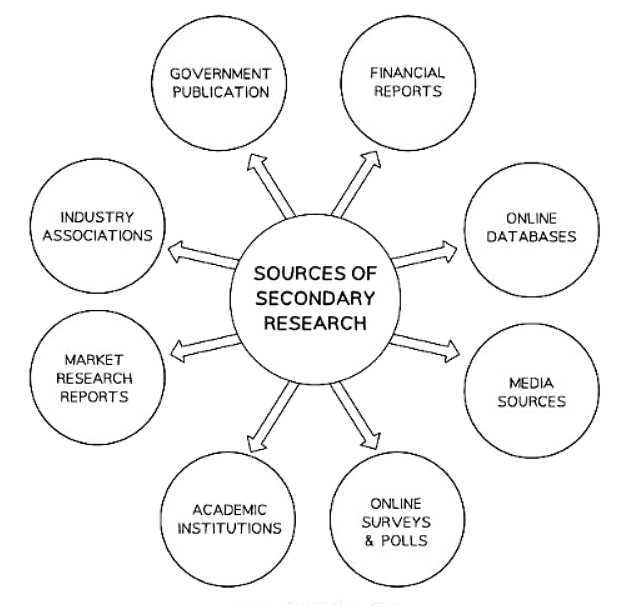Class 10 Exam > Class 10 Notes > Business Studies for GCSE/IGCSE > Secondary Market Research
Secondary Market Research | Business Studies for GCSE/IGCSE - Class 10 PDF Download
Secondary Market Research
- Secondary research entails gathering, organizing, and examining pre-existing data.
Secondary Research Sources

- Government Publications: National governments and trading blocs like the EU release reports and data on various subjects such as the economy, demographics, and industry trends.
- Academic Institutions: Universities and research centers carry out studies and publish research papers offering valuable insights into specific industries and market trends. For instance, Stanford University excels in research related to engineering and medicine.
- Industry Associations: Trade associations and sector-specific organizations provide detailed information on market specifics, including size, growth rates, and industry standards. An example is The International Organization of Motor Vehicle Manufacturers, which conducts research on production and sales statistics.
- Specialist Market Research Reports: Specialized market research companies create and sell comprehensive reports on various industries, markets, and consumer behaviors. Mintel, a prominent firm, is known for providing such information.
- Financial Reports: Publicly traded companies are mandated to publish annual reports that offer insights into their performance, market position, and future strategies.
- Online Databases: Various online databases and research platforms grant access to extensive secondary market research data. Platforms like Statista and Euromonitor International offer a vast array of international commerce data.
- Media Sources: Newspapers, magazines, and online publications often feature articles, opinion pieces, and investigative reports that shed light on market trends, consumer behavior, and industry advancements. Publications like The Financial Times and the Wall Street Journal provide such insights.
Choosing the Most Suitable Sources
- It's essential to select the right sources for your research. Opting for credible and up-to-date sources can significantly enhance the quality of your analysis and insights.
Advantages & Disadvantages of Secondary Market Research

Question for Secondary Market ResearchTry yourself: Which source of secondary market research provides comprehensive reports on various industries, markets, and consumer behaviors?View Solution
The Importance of Accurate Market Research Data
- Accurate data collection and analysis are crucial for any business as they form the foundation for informed decision-making and risk mitigation.
- Reliable data empowers businesses to establish achievable goals and effectively monitor their performance over time.
Significance of Gathering Reliable Data
- Gathering and analyzing trustworthy data play a pivotal role in guiding strategic choices within a business.
- This process aids in minimizing uncertainties, enabling companies to make well-informed decisions.
Supporting Decision-Making and Risk Reduction
- Reliable data supports the decision-making process by providing a factual basis for strategic choices.
- By reducing ambiguity and uncertainty, businesses can minimize risks and operate more efficiently.
Setting Realistic Objectives and Performance Management
- Having access to accurate data helps businesses in setting achievable objectives that align with their long-term strategies.
- Monitoring performance based on reliable data enables companies to track progress and make necessary adjustments for success.
Factors Affecting the Reliability and Accuracy of Market Research
- How the questions are framed in surveys or questionnaires
- The meticulousness in selecting and representing the sample, considering size and types of respondents
- The expertise, research skills, and credibility of the researchers
- Potential biases during research implementation and result analysis
- The timing and location of the research
- The impact of changing customer preferences, trends, economic factors, and technology on data relevance
- Varying opinions of customers across different geographical regions
The document Secondary Market Research | Business Studies for GCSE/IGCSE - Class 10 is a part of the Class 10 Course Business Studies for GCSE/IGCSE.
All you need of Class 10 at this link: Class 10
|
70 videos|93 docs|26 tests
|
FAQs on Secondary Market Research - Business Studies for GCSE/IGCSE - Class 10
| 1. Why is accurate market research data important? |  |
Ans. Accurate market research data is important because it provides businesses with valuable insights into consumer preferences, market trends, and competitors. This information helps companies make informed decisions and develop effective strategies to stay competitive in the market.
| 2. How can inaccurate market research data impact a business? |  |
Ans. Inaccurate market research data can lead to poor decision-making, wasted resources, and missed opportunities for growth. It can also result in products or services that do not meet customer needs, ultimately leading to decreased sales and profitability for the business.
| 3. What are some common sources of inaccurate market research data? |  |
Ans. Common sources of inaccurate market research data include outdated information, biased surveys or focus groups, unreliable secondary sources, and errors in data collection or analysis. It is important for businesses to carefully validate their research sources to ensure the accuracy of the data.
| 4. How can businesses ensure the accuracy of their market research data? |  |
Ans. Businesses can ensure the accuracy of their market research data by using multiple sources for data collection, conducting thorough data analysis, validating information through cross-referencing, and regularly updating their research findings. It is also important to work with reputable research firms or professionals to ensure the quality of the data.
| 5. What are the potential consequences of relying on inaccurate market research data? |  |
Ans. Relying on inaccurate market research data can lead to misinformed business decisions, wasted resources, damaged reputation, and decreased competitiveness in the market. It can also result in lost opportunities for growth and innovation, ultimately hindering the long-term success of the business.
Related Searches




















